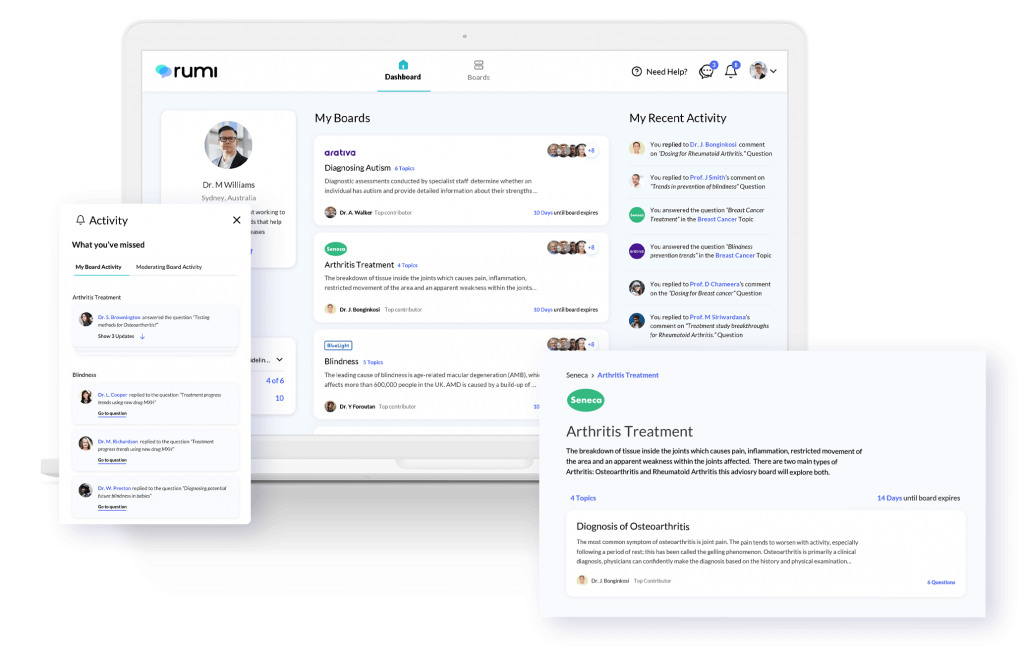Virtual HCP advisory board spearheading industry digital transformation
Today, VIVA! Communications partnered with the team at Rumi to launch their innovative digital advisory board platform, designed to facilitate insight-generating, ‘any time’ HCP advisory boards in a time-efficient, cost-effective, multilingual, secure and Code compliant way.
The online platform, which is the brainchild of Australian pharmaceutical Digerati, is promising to transform the pharmaceutical industry’s healthcare professional (HCP) engagement opportunities.
With ‘high workload’ and ‘competing personal and professional demands’ reportedly representing the two major sources of work-related stress for Australian HCPs (25 per cent and 26.8 per cent, respectively), demanding and inflexible advisory board requirements can impose an additional burden on already time-poor HCPs.
According to Rumi co-developer and Client Solutions Director, Swipe Health, Steve Royle, Sydney, the wired, forum-style platform eliminates the need for in-person attendance and the challenges associated with juggling conflicting schedules of time-poor HCPs, by allowing participants to think and respond when convenient to them.
“The virtual advisory board is ushering in a new era of HCP engagement as we strive to adapt to the ‘new normal’.
“COVID-19-imposed travel restrictions, shrinking pharmaceutical budgets and indefinitely grounded salesforces are compelling pharmaceutical companies to rethink, and re-strategise their tired, traditional stakeholder engagement initiatives,” said Mr Royle.
“Traditional advisory boards have long proven a substantial investment for the pharmaceutical industry, considering the time and fees involved with logistical coordination, not to mention the plethora of hard costs associated with venue and IT hire, HCP travel, accommodation, meals and honoraria, which can range anywhere between $40,000 to beyond $70,000 per advisory board, per annum.
“As a virtual, ‘any time’ advisory board, Rumi significantly reduces these hard costs by more than half, as well as minimises the labour required to coordinate the various logistics,” Mr Royle said.

Given more than 16 per cent of doctors report ‘speaking in front of an audience’ as another source of work-related stress, in-person meetings or live webinars may put some HCPs at a disadvantage, with ‘bigger personalities’ tending to dominate virtual discussions.
Rumi enables the HCP advisory board participant to ‘rumi’nate and research before submitting their highly considered responses and engaging with peers at their convenience, without needing to travel or take time out of their practice.
“This process is designed to enable deeper thinking and generate more meaningful insights, compared to the ‘on the spot’ answers involved with a webinar or physical meeting,” said Mr Royle.
Furthermore, the digital platform can translate into all languages, allowing HCP participants to join from any region world-wide, and to seamlessly contribute to the discussion.
By the end of this year (2020), almost 70 per cent of Australian HCPs will be ‘digital natives’ [those who studied medicine at a time when the internet was well established]. With COVID-19 propelling a widespread transition to digital, the pharmaceutical industry will be required to rapidly adapt to this evolving environment, in order to maintain ongoing stakeholder engagement via their preferred platforms.
“Our innovative digital platform offers users speed, flexibility and agility – attributes that will prove crucial to the pharmaceutical industry’s stakeholder engagement, moving forward,” said Rumi codeveloper and Managing Director of digital agency, ElephantsCanDance, Az Yousaf, Sydney.
“Rumi can be tailored to the user in many ways. The platform features extensive moderator tools designed to track user engagement and distribute public and private messages, as well as notifications to alert HCP participants to new responses or impending deadlines.
“Importantly, the platform automatically issues daily transcripts of HCP advisory board activity to the company’s pharmacovigilance team, to enable comprehensive monitoring for adverse event (AE) reporting,” said Mr Yousaf.
In recognition of patients and the importance of their opinions and experiences to the pharmaceutical industry, Rumi further enables companies to facilitate ‘virtual patient panels’, to generate discussion and glean meaningful insights to help guide the development and review of patient support initiatives.
Furthermore, with much of the pharmaceutical industry workforce currently working from home, the digital platform enables the delivery of engaging internal training and educational programs.
Companies can post materials, including videos and publications, and facilitate group discussions or obtain siloed individual responses.
Rumi’s application development is based on OWASP (Open Web Application Security Project) standards. Additional security controls help safeguard the application and its infrastructure from unauthorised access, including SSL, access permission control, content security policies, data at rest encryption, and data validation processes. Furthermore, Rumi is hosted by Amazon Web Services (AWS) and therefore, inherits AWS security certifications.
Tailored Rumi training sessions are available for all users, including sponsors, moderators and participants, in addition to user guides, email support and a Q&A feature.
To learn more, visit https://meetwithrumi.com/
